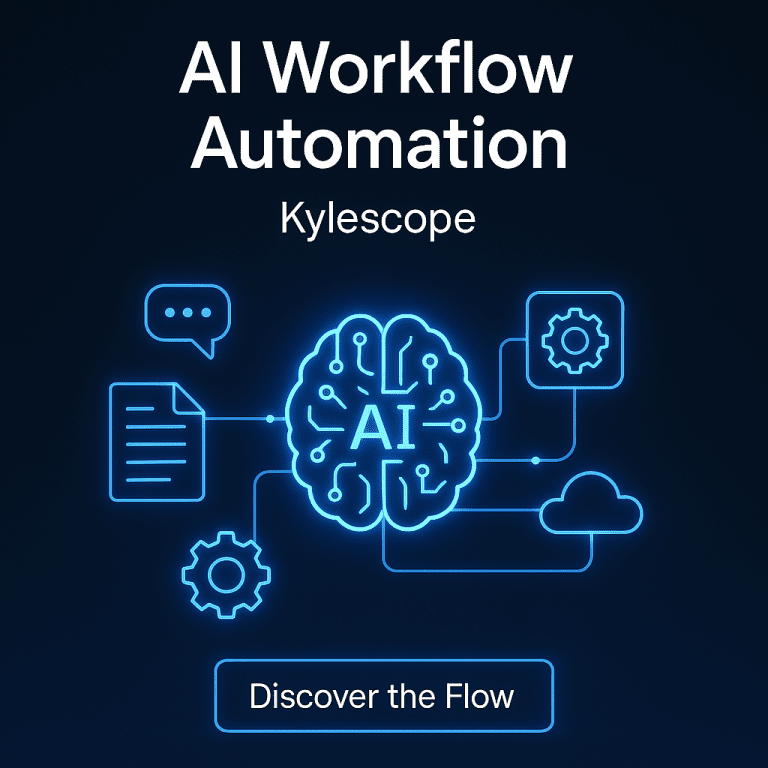AI Workflow automation is an emergent technology arising from the intersection between automation and artificial intelligence. Growth in technology, characterized by developments in artificial intelligence, has dramatically affected organizations’ capacity for work. One of the fields affected is the concept of workflow. AI is streamlining tasks and activities within organizations. This has created the idea of artificial intelligence workflow automation.

What is AI Workflow?
AI Workflow refers to the incorporation of artificial intelligence platforms, tools, and templates to enhance workflow efficiency and productivity. The discovery of artificial intelligence tools and applications has had implications for how business organizations handle workflow. This form of digital evolution has seen organizations utilize automation platforms and templates to eliminate inefficiencies caused by manual work, thus improving interactions between the stakeholders of a business. Therefore, modern business organizations are using this modern automation to enhance business process metrics.
Application of AI Workflow Automation with Examples
Organizations are using artificial intelligence workflow automation in the following sectors:
- Invoice Processing
- Document categorization through sorting and tagging
- Customer support activities
- System monitoring in information technology operations
- Software deployment
- Access management
- Email campaigns
- Market research during competitor analysis, lead generation, and campaign idea generation
- Scheduling appointments
- Medical records management
- Inventory Management
- Order fulfillment
- Suppler coordination
- Student progress tracking
- Educational content personalization
- Admission processing for students
- Website development-
- Sales and upselling
- Recruitment and hiring
- Predictive maintenance in industries
- Operations management
- Financial reporting
- Dynamic pricing
- Data entry activities
- Customer relationship management
- Predictive analytics
Elements of AI Workflow Automation
AI Workflow comprises numerous technologies that businesses and companies integrate to enhance operations. These elements include:
- Application Programming Interfaces (API)
- Generative Artificial Intelligence
- Intelligent Automation
- Machine Learning
- Natural Language Processing
- Optical Character Recognition
- Business Process Automation
The section below defines and elaborates on each of the elements.
Natural Language Processing
Natural language processing (NLP) is a field of artificial intelligence that links machine learning with humans through computer interfaces to enable communication with human beings. An example of an NLP in action is the case of a company receiving numerous reviews on social media platforms. It is cumbersome to read through all the reviews manually. Therefore, an NLP gathers all the reviews and preprocesses the gathered material by eliminating and correcting errors. The NLP then categorizes the sentiments through labels like positive, negative, or neutral before generating insights. Other examples of NLPs in action include chatbots, voice assistants, and Email filtering.
Optical Character Recognition (OCR)
Optical Character recognition is the extraction of data from images to their textual equivalent for comprehension by a computer system. Such systems help business organizations or companies to digitize information from books, writing, and other media forms into their database.
Machine Learning
Machine learning refers to a branch of artificial intelligence that utilizes algorithms and provides data to emulate human thinking, make predictions, and enhance efficiency through steady improvements.
Intelligent Automation
Intelligent automation is the foundation of AI-automated workflows. It entails the integration of automation technologies to structure and accelerate decision-making within an organization. For instance, the processing of insurance claims in the healthcare industry using artificial intelligence requires the scanning of documents using OCR, patient information validation using machine learning, and the implementation of robotic process automation to channel claims to the relevant branches for AI decision-making.
Generative Artificial Intelligence
Generative artificial intelligence refers to AI that accesses large language models to extract media, including texts, images, videos, audio, or software, based on user queries or requests. Technologies such as these help companies or businesses to enhance workflows and determine outputs. These technologies provide information pertinent to organizational goals, including setting up meetings, finding ways to traverse organizational problems, and much more.
Business Process Automation
Business process automation refers to the process of utilizing software to complete multifaceted and recurring tasks. Organizations typically use business process automation for tasks such as order processing and customer account management. They are therefore efficient for handling operations like employee onboarding, payroll, and other manual tasks.
Application Programming Interface (API)
An API refers to an interface that empowers computer users to provide rules and protocols that enable communication between applications for data transfer, exchange, and operations. For example, the transfer of monetary funds from a website’s customer into the website’s bank account necessitates the intervention of an application programming interface.
The Benefits of AI Workflow Automation
The main benefits of utilizing artificial intelligence workflows include the following:
- Operational cost reduction for businesses and companies is achieved because organizations that implement these systems eliminate friction and ineffectiveness. Moreover, they can dedicate human resources to focus on high-value tasks and ultimately increase efficiency.
- Human errors can sometimes arise from manual work or human nature. Automation can reduce these errors, as humans tend to make mistakes while doing complex tasks, and AI can achieve these tasks more quickly and with higher levels of accuracy.
- Improve decision-making, as AI automation can eliminate bottlenecks and the need for human interventions in real-time. Such systems derive analytics and insights that increase process inefficiencies.
- Enhancing customer support initiatives
- Restructure workflow and operations for improved efficiency
- Ease repetitive and recurrent tasks or activities- this can eliminate strain on the part of employees who focus on time-wasting activities. This is because artificial intelligence can handle such tasks and free up human resources to handle much more critical activities.
Challenges of AI Workflow Automation
Numerous challenges impede the implementation of AI Workflow automation, including:
- Stress among employees following its adoption, given that it is rumored to replace manual labor
- Knowledge of the initial setup, as it necessitates knowledge of existing systems, processes, and implementing changes
- The possibility of making errors during operations after implementation
- It requires additional training, which requires investments in training material
AI Workflow Automation Services
Finding AI workflow Automation experts is now easy. You can contact their services here. Such experts have trained not only in computer science and information technology but have also acquired certifications in artificial intelligence. Such experts work around the clock to ensure that your organization acquires what it requires. You can consult their services here.
Do you Need Help with AI Workflow Automation?
Share your details and we shall get back to you
